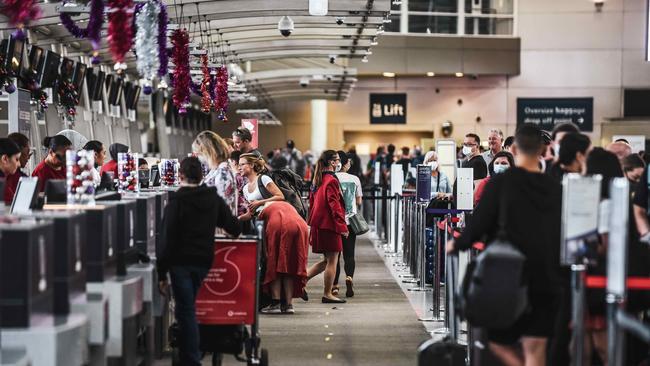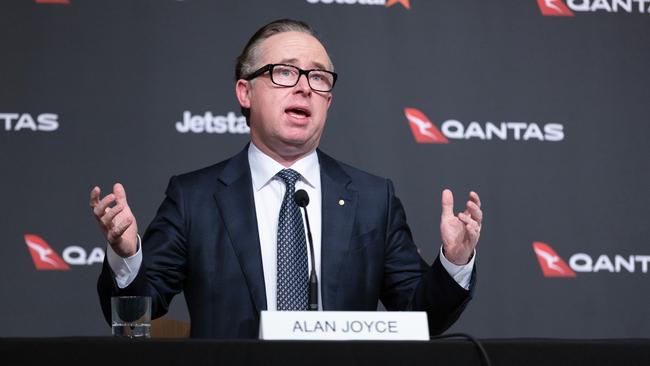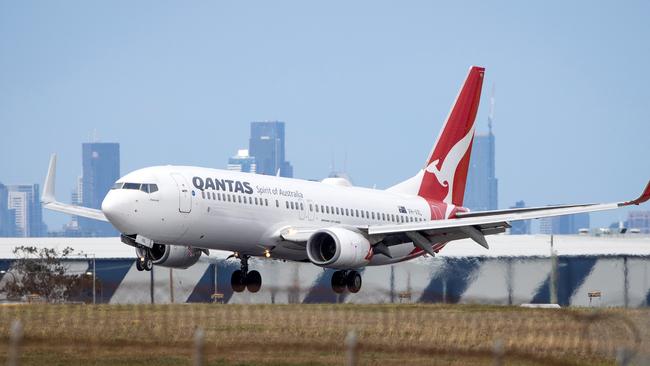Airline passengers face eight-hour wait under Covid travel rules
‘Wildly inconsistent’ rules for vaccinations, testing and destination restrictions will cause chaos for travellers, leading airlines warn.

Airline passengers will have to wait 8 hours in airports to be processed unless governments radically simplify Covid-19 travel rules, the world’s top club of airlines has warned, as it laid out an ambitious plan achieve “net zero emissions by 2050”.
The International Air Transport Association has slammed “wildly inconsistent” rules for vaccinations, testing, destination restrictions and passport status at a major conference in Boston, which attracted most of the world’s top airline chief executives, including Qantas’s Alan Joyce.
“Travel restrictions are a complex and confusing web of rules with very little consistency among them. And there is little evidence to support ongoing border restrictions and the economic havoc they create,” said Willie Walsh, IATA’s Director General, who feared baseless rules could remain in place too long without sunset clauses.
“We think it would be wrong because of a decision taken in 2020 that in 2030 we’re still wearing masks,” he said, suggesting the mandates be removed “as soon as it’s scientifically demonstrated that it’s not adding any value”.

US federal authorities have extended the requirement to wear masks on planes until January 2022. There is no end date for masks in Australia, as yet.
Reflecting mounting pressure on governments and businesses to unveil “net zero” plans ahead of the Glasgow climate change conference later this year, the IATA said airlines would require massive increases in the production of “sustainable aviation fuel”, and the roll out of commercially viable electric and hydrogen powered planes, to slash carbon dioxide emissions.
“Decarbonising the airline industry is a real challenge because there’s no clear solution in the short term,” Mr Walsh said, revealing a gross cost to the sector of US$2 trillion up until 2050, according to IATA modelling.
Fewer than 10 per cent of passengers internationally were opting to pay more for their tickets to abate carbon dioxide, IATA revealed.
The annual production of “SAF” (which is made from used cooking oil, municipal waste and woody biomass) would need to increase from 100 million litres a year anticipated in 2025 to 449 billion litres by 2050, the IATA said, releasing new modelling on Monday to chart a path to 2050.

“Delivering on that will require a huge collective effort from the entire aviation industry and value chain, including the major oil producers and investors,” the IATA said.
A split has emerged among major airlines with Chinese carriers adopting a 2060 target for net zero emissions, rather than the 2050 target more common in rich countries.
Deputy Director General Conrad Clifford also welcomed the Australian government’s “baby steps” to start to reopen the international border in November, but warned “confusion and chaos” would rein if a byzantine patchwork of Covid19 regulations remained across jurisdictions.
“Governments claim to follow the science but the science can’t possibly justify such a wide variety of models and rules,” he said. “Unless process efficiency improves, the average time could increase to 8 hours, bringing travel to a standstill,” he added.
Pre-pandemic passengers waited an average of 1.5 hours at airports, at both ends, to be processed, IATA analysis found.
Mr Walsh said requiring Covid19 tests and quarantine often wasn’t required given the positivity rate from testing was seven times greater in the general population than it was among air passengers.
“The risk of contracting covid aboard a plane very low,” he said.
Mr Walsh also said vaccine mandates to fly would be “grossly unfair” for people who wouldn’t access them, still common in developing countries. “And we don’t see any reason to mandate vaccines in domestic markets because you’re not introducing a new risk at all,” he added.
The chief executive of United Airlines, one of the biggest in the US, said the Trump administration deserved more credit for developing the Covid19 vaccines.
“It did a really great job with Operation Warp Speed,” he said, referring to the US government program that facilitated the development of the major Covid19 vaccines in use.








To join the conversation, please log in. Don't have an account? Register
Join the conversation, you are commenting as Logout